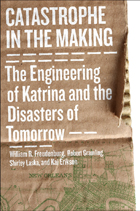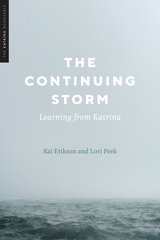
That’s the provocative theory of Catastrophe in the Making, the first book to recognize Hurricane Katrina not as a “perfect storm,” but a tragedy of our own making—and one that could become commonplace.
The authors, one a longtime New Orleans resident, argue that breached levees and sloppy emergency response are just the most obvious examples of government failure. The true problem is more deeply rooted and insidious, and stretches far beyond the Gulf Coast.
Based on the false promise of widespread prosperity, communities across the U.S. have embraced all brands of “economic development” at all costs. In Louisiana, that meant development interests turning wetlands into shipping lanes. By replacing a natural buffer against storm surges with a 75-mile long, obsolete canal that cost hundreds of millions of dollars, they guided the hurricane into the heart of New Orleans and adjacent communities. The authors reveal why, despite their geographic differences, California and Missouri are building—quite literally—toward similar destruction.
Too often, the U.S. “growth machine” generates wealth for a few and misery for many. Drawing lessons from the most expensive “natural” disaster in American history, Catastrophe in the Making shows why thoughtless development comes at a price we can ill afford.

More than fifteen years later, Hurricane Katrina maintains a strong grip on the American imagination. The reason is not simply that Katrina was an event of enormous scale, although it certainly was by any measure one of the most damaging storms in American history. But, quite apart from its lethality and destructiveness, Katrina retains a place in living memory because it is one of the most telling disasters in our recent national experience, revealing important truths about our society and ourselves.
The final volume in the award-winning Katrina Bookshelf series The Continuing Storm reflects upon what we have learned about Katrina and about America. Kai Erikson and Lori Peek expand our view of the disaster by assessing its ongoing impact on individual lives and across the wide-ranging geographies where displaced New Orleanians landed after the storm. Such an expanded view, the authors argue, is critical for understanding the human costs of catastrophe across time and space. Concluding with a broader examination of disasters in the years since Katrina—including COVID-19—The Continuing Storm is a sobering meditation on the duration of a catastrophe that continues to exact steep costs in human suffering.
READERS
Browse our collection.
PUBLISHERS
See BiblioVault's publisher services.
STUDENT SERVICES
Files for college accessibility offices.
UChicago Accessibility Resources
home | accessibility | search | about | contact us
BiblioVault ® 2001 - 2024
The University of Chicago Press









